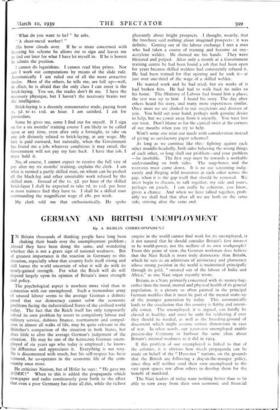WE ME UNEMPLOYED
By KENNETH NEEDHAM
OME of you tell me I am worthless and don't want to work. Some of you imagine that I am an earnest young man, with face emaciated by strain and privation, tramping the streets day after day looking for any sort of work that will bring me a little peace and security. Others of you have no time to consider me, you are too busy being indignant.
I am here: I am the unemployed. I am twenty-five years of age. I left school at fourteen, and since then I have been continuously engaged on manual labour that has never brought me in more than two pounds fifteen per week. At fourteen I started work in a cotton mill and worked there, bare-footed and in tropic heat, for eight years. It didn't get me anywhere. After eight years faithful service to that one god I was earning one pound thirteen each week: the reward of devotion. I left there to better myself by working in a large hotel. I had heard stories of luxurious living and lavish tips. Of employment in non-residential hotels I have no wish to speak here. I have recorded that in a book which will tome day see the dark of printers' ink.
I left the hotel after eighteen months and secured a job in a worsted mill. For a time fate was kind and the sun sent a little warmth down upon me. Then the worsted trade experienced a slump and disgorged me from my comfortable niche into the arms of the labour exchange.
I am then, the ordinary, loafing, uncouth, manual labour class of unemployed young man. I am the unemployed. What then do I think about your schemes? What dark, evil broodings take place behind my frowning mask as I shuffle listlessly by you in the street? Am I longing for a gun, or a piece of rubber hose—or a job? Shall we look at some of the things you are saying about me, and see?
Firstly, you are advocating compulsory labour and com- pulsory training. Queer how that word " compulsory " is bandied about so easily and freely in England today. We have seen ruthless methods, coupled with loss of liberty, so effective in totalitarian States that we are apt to be secretly a little jealous of those methods and a little careless in allowing that ugly word " compulsory " to find a place in our ideology. Once it would have been flung out unhesitantly: now it sits there quiescent.
Compulsory labour: for whom? You cannot introduce it for me without also introducing it for yourself. You cannot remove my freedom of choice without damaging your own. Consider for a moment how much of your self-respect, how much of the stiffness that holds your neck and shoulders up, how much of that give and take between employer and employee depends upon the unstated tenet that you are free to throw up your position at the first sign of unfairness, the first pressure of the screw, the first attempt to remove from you the status of an independent man. Most of us, even if we are employers, are also employees ; there is someone higher up. And the moment we put up a notice of "No Smoking" for the office-boy we put it up for everyone else. Before you give me a spade and compel me to go digging at next to no wage, just sit back a moment and remember that in law, I am you, and you are also me.
Most indignant consternation, at the moment, is caused by the many Government training schemes which are being ignored by the unemployed. The Prime Minister expresses the country's disappointment that the young men have not availed themselves of the Government's generosity. And so we all start again, throwing accusations and recriminations at each other: both sides talking from different viewpoints and in a language neither understands. We are like two parties of tunnellers at opposite sides of a hill, boring our way through in wrong directions and obstinately refusing to take bearings with each other.
If the unemployed refuse to train for skilled jobs, is it not obvious then that there must be reasons? Either the unemployed are shiftless and content or there is something wrong with the training schemes or their administration.
If the unemployed are shiftless and content then com- pulsory training and compulsory labour are the only solutions. Some of the unemployed do belong to that type ; that is only natural by the ordinary process of gravitation. But, before condemning them all et us look at the training schemes and see if any fault lies Were.
I have one of the nicely illustrated brochures here. You can obtain one from any labour exchange, but you cannot look at it through my eyes. You cannot experience the caution and the suspicion with which the unemployed regard all Ministry of Labour forms and sheets of literature. We have been done down too often with nice words and neatly- turned phrases. Let me examine this brochure on the Government's training scheme for you.
There are twenty-four trades listed. I see that after a six months' free training course I can become such a skilled workman as an optical lens-grinder, a scientific instrument maker, an electric welder or a sheet-metal worker. There are other such attractive trades, and, if I do not aspire so high, I can learn the rough but nicely lucrative trade of brick-laying. My imagination is stirred by this offer of the way to freedom and escape. I will become a sheet-metal worker : not too high, tempting the gods, not too low.
I approach the clerk whose job it is to deal with the training schemes and tell him of my decision. He smiles like one welcoming a long-lost brother. He rubs his hands and becomes extraordinarily genial. What do you want to be? ' he asks.
A sheet-metal worker! "
His brow clouds over. If he is more concerned with fostering his scheme he allows me to sign and leaves me to find out later for what I have let myself in. If he is honest he admits the position.
I cannot do logarithms I cannot read blue prints. Nor can I work out computations by means of the slide rule. Automatically I am ruled out of all the more attractive trades. Most of the others, he tells me, are full up—well, in effect, he is afraid that the only class I can enter is the brick-laying. You see, the trades don't fit me. I have the necessary physique, but I haven't the necessary brains nor the intelligence.
Brick-laying is a decently remunerative trade, paying from is. 5d. to Is. iod. an hour. I am satisfied. I ask for particulars.
Some he gives me, some I find out for myself. If I sign on for a six months' training course I am likely to be called upon at any time, even after only a fortnight, to take on any job distantly related to brick-laying, at any wage. My fare is paid outward, but naturally, when the Government has found me a job, whatever conditions it may entail, the Government will not pay my fare back. I have that job, I must hold it.
No, of course, I cannot expect to receive the full rate of pay after my six months' training, explains the clerk. I am what is termed a partly skilled man, on whom can be pushed all the black-leg and other unsuitable work refused by the skilled men. Instead of the is. sd. per hour of the skilled brick-layer I shall be expected to take 7d. to I'd. per hour as most trainees find they have to. I shall be a skilled man commanding the magnificent wage of 28s. per week.
My clerk told me that enthusiastically. He spoke pleasantly about bright prospects. I thought, wearily, that the brochure said nothing about imagined prospects : it was definite. Coming out of the labour exchange I met a man who had taken a course of training and become an oxy- acetylene welder. He showed me his hands. They were blistered and pulped. After only a month at a Government training centre he had been found a job that had been open for years because skilled welders had consistently refused it. He had been trained for that opening and he took it—at just over one-third of the wage of a skilled welder.
He wanted work and he had tried, but six weeks of it had broken him. He had had to walk back 6o miles to his home. The Ministry of Labour had found him a place; the rest was up to him. I heard his story. The day after others heard his story, and many more experiences similar. Once more we are cloaked in our suspicions and distrust of you. You hold out your hand, perhaps with genuine desire to help, but we cower away from it uneasily. You have lost our trust. Don't blame us for the cynical twist at the corners of our mouths when you try to help.
Won't some one treat our needs with consideration instead of giving us satisfactory paper schemes?
As long as we continue like this : fighting against each other muddle-headedly, both sides believing the wrong things of each other, so long shall our problem—and your problem —be insoluble. The first step must be towards a workable understanding on both sides. The soap-boxes and the rostrums must come down. It is no use screaming indig- nantly and flinging wild invectives at each other across the gap, when it is the gap itself that should be removed. We must begin to discuss, to talk together, my side and yours, perhaps on panels. I can really be coherent, you know, given a chance. And when we have talked together, prob- ably we shall find that after all we are both on the same side, striving after the same end.











































 Previous page
Previous page